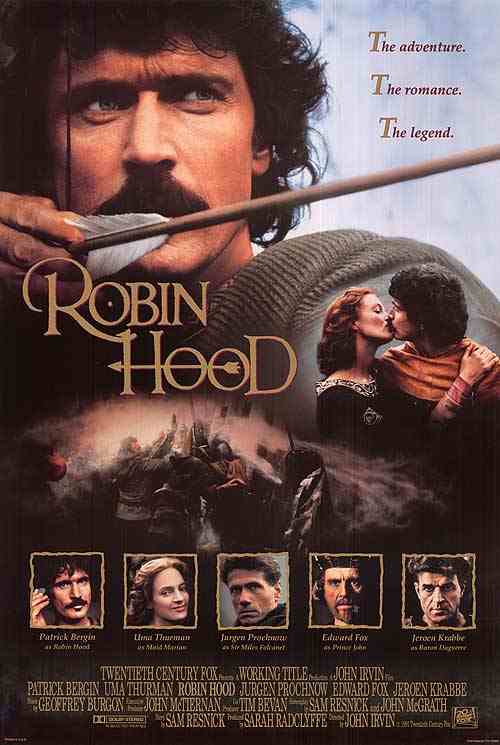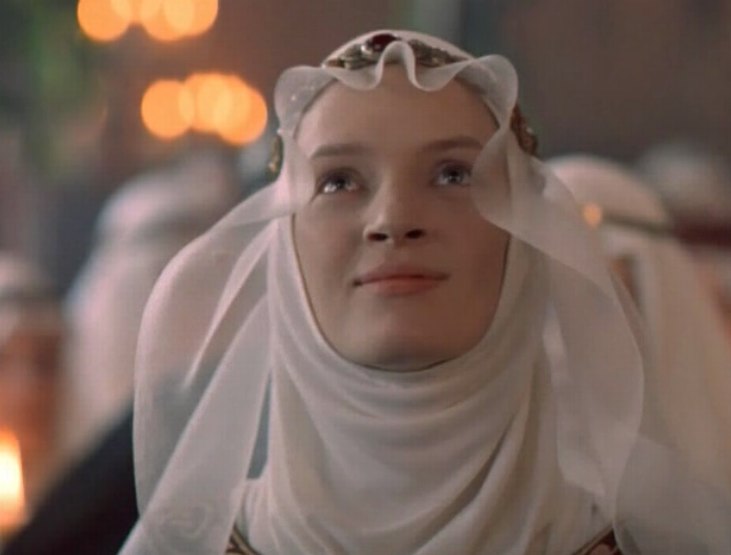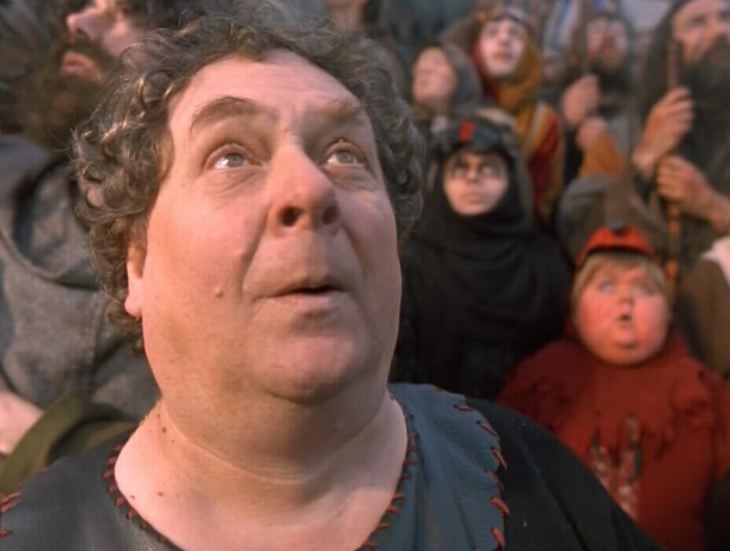Monday May 03, 2010
Review: Robin Hood (1991-BBC)
WARNING: PIERCING SPOILERS
This one surprised me. It’s tough to make a legend like Robin Hood feel new but this one comes close for this reason: it doesn’t pretend to be legendary as it’s happening. Let’s face it, none of us really knows what we’re doing. We make up this stuff as we go, and only after the fact does a pattern (possibly) emerge. At which point we say, “Oh, I get it. This is the story.”
What’s the story, or the legend, of Robin Hood? He’s a man, a noble, who stands up to a corrupt prince and his minions during a time when the legitimate king, Richard the Lionheart, is away at the Crusades or captured in Austria. He’s the best archer in the land, and not bad with a sword, either. He’s a swashbuckler, and he and his men live in Sherwood Forest and rob from the rich and give to the poor. And they have a grand time doing it. Hell, they’re merry doing it. Oh, and there’s a girl, too, since there’s always a girl. And in the end Robin gets the girl, the bad guys get their comeuppance, and Richard is reinstalled as the one and true King of England. Sound trumpets.
 Who is Robin Hood here? He’s Sir Robert Hode, Earl of Huntingdon (a perfect Patrick Bergin), a Saxon noble in a land dominated by Norman conquerors. Which means he’s privileged and not, master and not. Sure, he doesn’t like injustice, but he doesn’t like a lot of things. He does like women and drinking, however. He relishes a fight, too. Whenever someone lands a blow he comes up smiling, eyes flashing. He also has a sense of privilege (he’s a noble, after all), and a hair-trigger temper (ditto), and he tends to get involved against his better judgment. Then he shakes his head and thinks, “Crap, how did I wind up here?” Even though here is the legendary place we know he should be. His better instincts, in other words, are telling him not to become what he famously becomes.
Who is Robin Hood here? He’s Sir Robert Hode, Earl of Huntingdon (a perfect Patrick Bergin), a Saxon noble in a land dominated by Norman conquerors. Which means he’s privileged and not, master and not. Sure, he doesn’t like injustice, but he doesn’t like a lot of things. He does like women and drinking, however. He relishes a fight, too. Whenever someone lands a blow he comes up smiling, eyes flashing. He also has a sense of privilege (he’s a noble, after all), and a hair-trigger temper (ditto), and he tends to get involved against his better judgment. Then he shakes his head and thinks, “Crap, how did I wind up here?” Even though here is the legendary place we know he should be. His better instincts, in other words, are telling him not to become what he famously becomes.
The movie begins with Norman knights, led by the Norman Sir Miles Folcanet (Jurgen Prochnow of “Das Boot” fame), hunting a man who’s been poaching on royal lands. First the man tries to take his buck with him; then he abandons it, runs, but keeps falling; then, just as the hounds are upon him, he falls at the feet of...wait for the pan up...Robin Hood! Except he’s not Robin Hood yet, he’s Robert Hode, and even as the poacher, Much, recognizes him and says, “Help me, Sir Robert,” he simply stands there. He stands there as Much is caught, admonished, and—since this is his second offense—threatened with having his eyes put out. It’s up to Robert’s friend, Will (Owen Teale), to tell him what the rest of us are thinking:
“Do something.”
Robert’s response? He rolls his eyes. Love that.
But once he confronts Folcanet he doesn’t do it in half-measures. He’s an Earl. He’s used to getting his way. And he gets pissed off when others, particularly Normans, stand in his way.
Hode: Leave him.
Falconet: Who do you think you are? This man is a poacher.
Hode: On my land. I have no objection to this man hunting on my land. He’s a useful member of our community. Who exactly are you?
Falconet: I am Sir Miles Falconet. And I am the guest of the Baron Daguerre to whom this land belongs. And certainly not to some Scottish Saxon.
But Hode is friends, too, with the Baron (Jeroen Krabbe), and in the next scene we watch them playing a board game while talking about the trial Hode will undergo the next day for confronting Falconet. Daguerre jokes, as he’s losing the board game, that he’ll have to give Sir Robert a flogging. Hode doesn’t see the humor. “You can’t do that,” he says. “I’m an Earl.” For good measure he adds, “Need I remind you that while your grandfather’s father was no more than a pirate, my great grandfather was chancellor to our King!” This pisses off Daguerre. Momentarily. He’s normally a diplomatic man, and at the trial the next day he weighs the offense and Hode’s title and recommends a public lashing: one lash. This pleases neither man but it’s Hode, with his hair-trigger temper, who’s more insistently displeased, and the number of threatened lashes keeps rising until Hode reveals the Baron’s corrupt, unnoble heritage and rails against the raping and pillaging of the Normans in general. At which point the Baron stands and decrees that Hode forfeits his title and land, and all things in his possession, and orders him shackled. Which is when Robin and Will take up arms and fight their way out to a nearby forest. I believe it’s called Sherwood.
This is not a California forest, by the way. It’s dark and cold, and as soon as Hode starts a fire with a flint it begins to rain. (“Bloody Normans,” he says.) The next day he has his legendary encounter with John Little (David Morrissey) on a log bridge over a roaring river, not a tepid stream. Hode: How are you at walking backwards?” Little: “I’ve never had to try yet, shortass.” Indeed. Hode gets knocked in and nearly drowns in the rapids. Little likes his spunk, though, and brings him and Will to a bandit/outlaw hideout, which is a dank, filthy cave, not an idyllic clearing. Much, the Miller, is there as well and Hode introduces himself, to Much’s amusement, as “Robin Hood,” since his status as an earl, even a deposed earl, would be problematic in the setting. The next morning Robin and Will are about to get kicked out again. Spunk only gets you so far. It’s one meal and off you go, Little tells them, adding, “Unless you can do something.”
Hode pauses, generally confused, and says, “I can shoot. A bit.”
This is not “The greatest archer in all the land.” This is a guy who knows he’s not bad with the bow-and-arrow but assumes others could be better. Of course when he goes up against the outlaws’ best archer, Harry (Alex Norton), the two of them aiming for a stick at 100 paces, Harry shoots his arrow right next to the stick but Hode, now Robin, to the astonishment of everyone—including, one assumes, himself—splits the freakin’ stick. There’s no feeling of inevitability here. On the contrary, you feel like Robin is telling himself: “You lucky bastard.” Equally surprising? This is the last time in the film he takes up bow and arrow.

Bergin's Robin Hood is one of the most underrated.
No, Robin reveals his true gift to the outlaws with his insider knowledge of the comings-and-goings of the rich. Told they’re staking out such-and-such a road to plunder, Robin suggests another, where he knows gold is being transported by Sir Miles Falconet. And that’s what they do. Robin leads the men on a chase to a valley where Falconet thinks he has Hode; but Robin and his men have him. In the skirmish after the trial, Will cut Falconet’s neck and Hode asks about it. “How’s your wound? Hm. It’s healing.” Then anger suddenly, astonishingly pours out of him. “But some wounds never heal. Tell that to Daguerre: some-wounds-never-heal” and he presses his knife back into Falconet’s neck and reopens the wound.
Falconet and his men are stripped and ride past Maid Marian (Uma Thurman), who had been with the initial caravan, and she and Hode, who have had several back-and-forths in the film thus far, have another. As good as the film has been to this point, the stuff with Marian is, unfortunately, just as bad. It’s like they’re trying to do “Big Sleep”-ish double entendres but it’s all cringe-worthy:
Marian: So. What are you going to do with me—tie me up?
Robin: Could be a lashing.
Marian: How many strokes?
Robin: As many as are necessary... Have you been lashed before?
Marian: I’ve never had someone make me beg them me to stop.
Robin: (smiles): Then you’ve never had a proper lashing.
Seriously? Thurman is bad in this, too. Her casting, which seems perfect, is actually one of the worst things about the movie.

Absolutely beautiful. But all wrong for the role.
So the two sides keep raising the stakes. Robin steals money? Then the Baron raises taxes to make up the difference. “That’ll make him really popular,” he says. The Baron raises taxes? Robin takes the taxes. Robin and his men save two children from hanging? The Baron burns down a village. They torture a man to death to find out where Robin is. They take everything—including a 12-year-old girl. Then they further raise the reward on Robin Hood. So what does Robin do? He gives the money back to the poor to keep them on his side. “It’s their money anyway,” he says. “Their taxes.” The response from Harry and some of the other outlaws is expected. “Give it away?” Harry says. “Are you crazy?” Thus are legends borne out of happenstance. We make this shit up as we go.
The Baron, in this version, is basically the Sheriff of Nottingham—as Folcanet is Gisbourne—but he’s not, despite the aforementioned tortures, outrightly evil. The Sheriff is normally portrayed as glowering and scheming in cahoots with Prince John, but here he has to answer to Prince John (Edward Fox). Prince John wants the money, the taxes, but the Baron doesn’t have them. John is both amused and not. “They sing ballads,” John says of the people and Robin Hood. “They see a new Saxon leader emerging.” So John leaves 40 soldiers with this incompetent Baron who let things get out of hand. Then he gets histrionic. “You will turn over every blade of grass in Barnsadle, Sherwood and Nottingham until this man and his cutthroats are brought to the gallows and disemboweled while they still breathe. I will not have my throne threatened! I will not have Saxon mark Norman! And I will have my money!”
Not much comes of this, and there’s too much subplot with Marian. She disguises herself as a boy to get close to Robin but Robin figures it out (it only takes a profile), then Harry finds out, then Harry, bastard, betrays everyone by returning Marian to the Baron and Falconet. He expects a reward but gets tortured for information. We last see him hanging eyeless in a cage outside the castle. Remember in the ’38 version when arrows pierced the chests of knights and no blood emerged? Those are stories for children.
Unfortunately it all comes down to Marian’s wedding of convenience with Folcanet, which leads Robin and his men to storm the castle during All Fool’s Day. Robin and Folcanet battle with broadswords while Will gets his big scene, convincing the Baron to lay down his arms, to join Norman and Saxon. The movie ends with the marriage of Norman (Marian) and Saxon (Robin), at which point the sun, which we haven’t seen during the film, and which will symbolize the modern British empire, finally emerges. Modern England can finally be.

The sun, which someday will never set on the British Empire, finally shows up and warms Friar Tuck.
What a shame. The last 15 minutes of this film do a real disservice to the first 90. Prochnow overacts horribly in the last half, too.
But the first 90 are fascinating. What a great story! An occupied noble with a hair-trigger temper and a love of fighting bands with commoners and uses his insider knowledge to bring down the occupiers. It’s not the stuff of legend, but it ain’t bad.
Baseball's Active Leaders, 2023
What Trump Said When About COVID
Recent Reviews
Everything Everywhere All at Once (2022)
Black Panther: Wakanda Forever (2022)
Doctor Strange in the Multiverse of Madness (2022)
Spider-Man: No Way Home (2021)
The Cagneys
A Midsummer Night's Dream (1935)
Something to Sing About (1937)
Angels with Dirty Faces (1938)
A Lion Is In the Streets (1953)
Man of a Thousand Faces (1957)
Never Steal Anything Small (1959)
Shake Hands With the Devil (1959)







